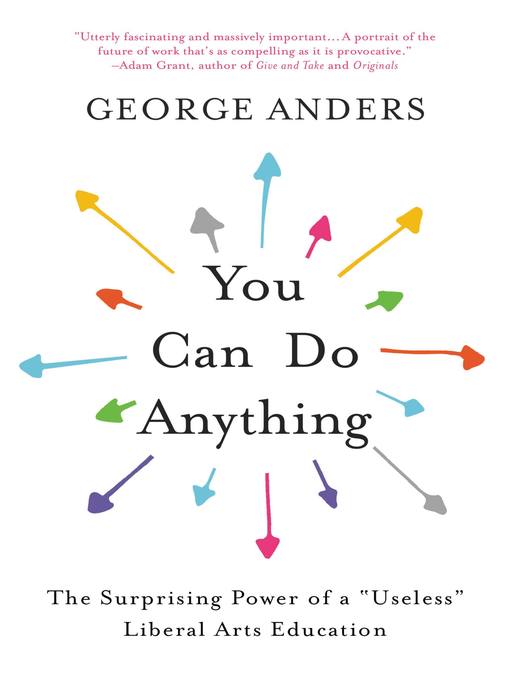
You Can Do Anything
The Surprising Power of a "Useless" Liberal Arts Education
کتاب های مرتبط
- اطلاعات
- نقد و بررسی
- دیدگاه کاربران
نقد و بررسی

May 15, 2017
An argument for the usefulness of a major in liberal arts.Forbes contributor Anders (The Rare Find: How Great Talent Stands Out, 2011, etc.) offers encouraging advice for students worried about choosing a college, a major, or finding a job after graduation. In a "rapidly evolving high-tech future," he writes, there will be "thousands of openings a week" for graduates who majored in subjects such as philosophy, anthropology, or English. These humanities and social science majors are the people businesses want to hire, Anders maintains, for their intellectual curiosity, creativity, empathy, critical thinking skills, and ability to write. These are the qualities, argues the author persuasively, that are hallmarks of the liberal arts. Like most self-help books, this one is rolled out in short, pithy chapters filled with jaunty anecdotes about successful job hunters who managed to apply their education to a "new category of jobs" that require new abilities: "to read the room--and to get different people on the same page"; to handle ambiguity and use ingenuity to solve problems; and to "inform, entertain or inspire." Anders unpacks the idea of critical thinking, central to the liberal arts, by highlighting the various skills that critical thinking entails: interpreting controversial topics, for example, filtering and distilling information, and being comfortable with "non-linear thinking." The jobs that the author sees arising all connect to technology: market research, which depends on online surveys; recruiting and career coaching, which use giant databases to find candidates; fundraising, which depends on technology "to go prospecting for donations" and mount online campaigns; digital designers; and project managers. Anders acknowledges that these technology jobs may require learning new skills, but he believes that liberal arts majors have "the enthusiasm and temperament to prevail in uncharted domains." Campus career centers, he cautions, may not have caught up with the multiplicity of new opportunities, but many, he has found, have begun "career-friendly initiatives." Anders ends with a step-by-step protocol for getting jobs that can lead to a satisfying career. Useful guidance for newly minted job hunters.
COPYRIGHT(2017) Kirkus Reviews, ALL RIGHTS RESERVED.

July 1, 2017
Anders (contributing writer, Forbes; Perfect Enough), who is clearly passionate about the value of a liberal arts education, describes the career paths of dozens of men and women who parlayed their humanities education into personally and financially rewarding careers. Supplementing anecdotal evidence with research findings, he reveals that humanities majors' long-term salaries and career satisfaction exceed those of graduates of "vocationally oriented" programs of study. The success stories demonstrate that liberal arts majors' career paths are often unconventional and nonlinear. The author also provides examples of businesses, nonprofit organizations, and government agencies that make a practice of hiring liberal arts majors, as well as fields for which such students are ideally suited, including market research, social media, fundraising, and project management. Throughout, Anders convincingly demonstrates how savvy liberal arts majors can chart a course to a rewarding career. VERDICT This book deserves a broad readership of university faculty, administrators, and career personnel, as well as recruiters, hiring managers, and liberal arts majors (and their parents).--Alan Farber, Univ. of North Carolina, Chapel Hill
Copyright 2017 Library Journal, LLC Used with permission.

August 1, 2017
Philosophy and anthropology students take heart. The same skills you learned in classroom debates and complex text analysis can lead to high-paying jobs, according to Forbes contributing-writer Anders. Unlike a degree in computer science or engineering, a liberal-arts degree teaches students to question assumptions, face ambiguity, and use teamwork, all skills that are useful in the ever-changing job environment. Anders claims that there is a growing need for people able to bridge the gap between the tech-savvy and the tech-floundering. He follows a number of liberal-arts majors whose meandering work paths have led to major successes. He profiles companies as different as IBM and Pinterest to show how applicants who can solve problems and build teams, and who have had a variety of experiences, can land top jobs. Anders offers tips for presenting these qualifications in ways that will spark interest in companies, and he encourages older workers to broaden their search scope. Give this to anyone who is questioning the value of a classical education in today's fast-paced world.(Reprinted with permission of Booklist, copyright 2017, American Library Association.)

























دیدگاه کاربران